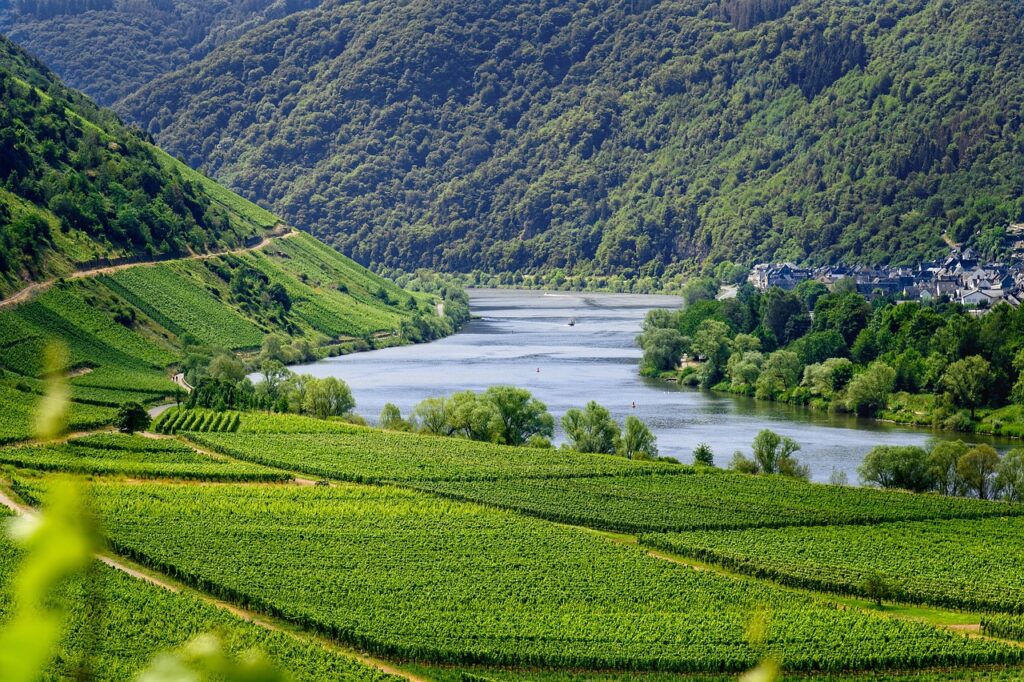You’re in for a delightful journey as you uncover the hidden gems of the Greek islands’ wine renaissance. From the volcanic soils of Santorini to the lush vineyards of Crete, this article takes you on a captivating tour of Greece’s flourishing wine regions. Prepare to be enchanted by the rich flavors, unique grape varieties, and centuries-old winemaking traditions that have propelled Greek island wines into the spotlight. Get ready to sip your way through this stunning Mediterranean paradise.

History of Wine in Greece
Early Beginnings of Wine Production
Greece has a rich history of wine production, dating back thousands of years. The ancient Greeks were among the first civilizations to cultivate grapes and produce wine. The favorable climate and fertile soil of the Greek islands provided the perfect conditions for grape cultivation. The ancient Greeks considered wine to be a gift from the gods and it played a significant role in their culture and everyday life.
Ancient Greek Wine Culture
In ancient Greece, wine was an integral part of religious rituals, social gatherings, and even medicinal practices. The Greeks believed that wine had the power to bring people closer to the gods and achieve a higher state of consciousness. They also used wine as an offering to the gods and as a symbol of hospitality. Wine was so highly valued that it was often used as currency in trade and commerce.
Decline of Greek Wine Production
Despite its importance in ancient Greek culture, the production and consumption of wine declined during the Byzantine Empire and the Ottoman rule. Wine production became limited to monasteries and vineyards were often neglected. Additionally, under Islamic rule, alcohol was prohibited, further suppressing the wine industry in Greece.
Revival of Greek Island Wineries
Emergence of Modern Greek Winemakers
In the 20th century, there was a renewed interest in winemaking in Greece, particularly on the Greek islands. Modern winemakers emerged with a passion for reviving the ancient tradition and producing high-quality wines. These winemakers began experimenting with new techniques and varietals, blending traditional methods with modern innovations.
Rediscovery of Indigenous Grape Varieties
One of the most significant contributions of the revival of Greek island wineries was the rediscovery and preservation of indigenous grape varieties. These unique grape varieties had been cultivated for centuries but had fallen into obscurity. Winemakers started working with local farmers to revive these ancient vines, bringing them back to the forefront of Greek winemaking. Today, Greek island wines are celebrated for their distinct and diverse flavors, often showcasing the unique characteristics of these indigenous grape varieties.
Exploring the Greek Island Terroir
Diversity of Greek Island Soils
The Greek islands are known for their diverse and geological soils, which greatly influence the flavors and characteristics of the wines produced. From volcanic ash in Santorini to limestone in Crete, each island has its own unique soil composition. These different soil types contribute to the complexity and depth of Greek island wines, creating a wide range of flavors and aromas.
Distinct Microclimates and Growing Conditions
The Greek islands boast an incredibly diverse range of microclimates, thanks to their geographical location and topography. From the hot and dry climate of Santorini to the cooler and more humid conditions of Crete, each island offers its own set of growing conditions. This variation allows winemakers to experiment with different grape varieties and produce wines that are unique to each island’s climate and terroir.
The Unique Grape Varieties of Greek Islands
Assyrtiko
One of the most iconic grape varieties of the Greek islands is Assyrtiko. Cultivated primarily in Santorini, Assyrtiko produces crisp and acidic white wines with mineral undertones. This grape variety thrives in the volcanic ash soil of Santorini, giving the wines a distinct character and unique flavor profile.
Xinomavro
Xinomavro is a red grape variety that is widely grown in northern Greece, particularly in areas like Naoussa and Amyndeon. It produces full-bodied red wines with high tannins and vibrant acidity. Xinomavro wines are often compared to the great Nebbiolo wines of Italy and have gained international recognition for their quality and ageability.
Malagousia
Malagousia is a white grape variety that was almost extinct until it was rediscovered in the late 20th century. It is primarily grown in central Greece, particularly in the region of Macedonia. Malagousia wines are known for their aromatic profile, with flavors of stone fruits and citrus. They are often described as elegant and floral, making them a favorite among wine enthusiasts.
Mavrotragano
Mavrotragano is a red grape variety that is indigenous to the island of Santorini. It produces intense and complex red wines with notes of dark fruits, spices, and earthy undertones. Mavrotragano thrives in the volcanic soil of Santorini and is highly sought after by wine connoisseurs for its depth and richness.

Iconic Wine Regions of Greek Islands
Santorini
Santorini is perhaps the most famous wine region in Greece, thanks to its unique volcanic terroir and the Assyrtiko grape variety. The volcanic ash soil, known as “aspa,” retains moisture and provides essential minerals to the vines. The hot and dry climate, along with the strong winds, leads to low yields but concentrated flavors. Santorini wines are prized for their crisp acidity, salinity, and distinct minerality.
Crete
Crete is another prominent wine region in Greece known for its diverse range of grape varieties and terroirs. The island’s mountainous landscape and varied microclimates allow for the cultivation of both red and white grape varieties. Notably, the white grape variety, Vilana, and the red grape variety, Kotsifali, are commonly found on the island. Crete wines are known for their richness, complexity, and age-worthiness.
Rhodes
Rhodes, the largest of the Dodecanese islands, has a long history of winemaking dating back to ancient times. The island’s warm and sunny climate, combined with its limestone and sandy soil, create ideal conditions for viticulture. Rhodes is known for its dry climate wines made from indigenous grape varieties such as Athiri and Mandilaria. These wines exhibit a unique blend of fruity and floral flavors with a touch of spice.
Tasting the Wines of Greek Islands
Characteristics of Greek Island Wines
Greek island wines are characterized by their vibrant acidity, distinct minerality, and a wide range of flavors. From the crisp and acidic Assyrtiko to the full-bodied and tannic Xinomavro, each wine offers a unique sensory experience. The volcanic terroir of Santorini imparts a distinct minerality to the wines, while the diverse soils of the other islands contribute different flavor profiles.
Traditional Winemaking Techniques
Greek winemaking traditions date back centuries and have been passed down through generations. Traditional winemaking techniques include hand harvesting, foot stomping, and aging the wines in oak barrels or clay amphorae. These methods preserve the authenticity and character of the wines, allowing them to reflect the unique terroir of the Greek islands.
Modern Innovations
While Greek winemakers value their traditions, they are also embracing modern techniques and innovations. From temperature-controlled fermentation to stainless steel tanks, these advancements ensure consistency and quality while preserving the unique flavors of the indigenous grape varieties. The combination of traditional and modern winemaking practices has allowed Greek island wines to gain international recognition.

Wine Tourism on Greek Islands
Visiting Greek Island Wineries
Exploring the wineries of the Greek islands is a delightful experience for wine enthusiasts. Many wineries offer wine tastings and tours, allowing visitors to learn about the winemaking process while enjoying breathtaking views of the vineyards. Wine enthusiasts can immerse themselves in the rich history of Greek winemaking and witness firsthand the dedication and passion of the winemakers.
Wine Festivals and Events
Greek islands host numerous wine festivals and events throughout the year, celebrating the rich wine culture and heritage of the region. These festivals provide an excellent opportunity to taste a variety of Greek island wines and learn about different grape varieties and winemaking techniques. From Santorini’s renowned Wine Festival to Crete’s Wine and Food Festival, there is no shortage of opportunities to indulge in the flavors and aromas of Greek island wines.
Gastronomic Experiences
Greek island wines are often paired with the delicious and diverse cuisine of the region, creating unforgettable gastronomic experiences. Many wineries offer food and wine pairing experiences, where visitors can savor local dishes alongside their wines. From traditional Greek meze to fresh seafood delicacies, the combination of flavorful food and exceptional wines is a true delight for the senses.
The Global Recognition of Greek Island Wines
International Wine Competitions and Awards
Greek island wines have been gaining recognition and accolades on the global stage. They have consistently received high scores and medals in prestigious international wine competitions, showcasing the quality and craftsmanship of the winemakers. These accolades have helped put Greek island wines on the world wine map and attract wine lovers from around the globe.
Increasing Export Markets
Recently, Greek island wines have seen an increase in export markets, with more and more wine enthusiasts discovering and appreciating their unique characteristics. The distinct flavors, combined with the heritage and history of Greek winemaking, have made these wines highly sought after in international markets. Today, Greek island wineries are exporting their wines to countries across Europe, the United States, and even Asia.

Challenges and Future of Greek Island Wineries
Climate Change and Viticulture
Like many other wine regions around the world, Greek island wineries face the challenges posed by climate change. Rising temperatures, increased droughts, and unpredictable weather patterns can impact grape ripening, vine health, and overall wine production. Winemakers are adapting by implementing sustainable viticulture practices, employing irrigation techniques, and exploring new grape varieties that are better suited to changing climates.
Sustainable Wine Production Practices
With an increasing global focus on sustainability, Greek island wineries are embracing environmentally friendly practices. Many wineries are adopting organic and biodynamic farming methods, reducing their carbon footprint, and implementing water conservation measures. These sustainable practices not only protect the environment but also contribute to the quality and authenticity of the wines.
Innovation in Winemaking
To stay competitive in the global wine market, Greek island wineries are embracing innovation and experimenting with new winemaking techniques. From exploring different yeast strains to aging wines in alternative vessels, winemakers are constantly pushing the boundaries and striving for excellence. This dedication to innovation ensures that Greek island wines continue to evolve and captivate wine lovers worldwide.
Conclusion
The history and revival of Greek island wineries provide a fascinating insight into the world of Greek winemaking. From ancient origins to a modern renaissance, the wines of the Greek islands are a testament to the dedication and passion of the winemakers. With their unique grape varieties, diverse terroirs, and commitment to quality, Greek island wines have rightfully earned their place among the finest in the world. Whether you are a seasoned wine enthusiast or a curious traveler, a visit to the Greek islands is a journey of discovery and a true celebration of wine culture.

